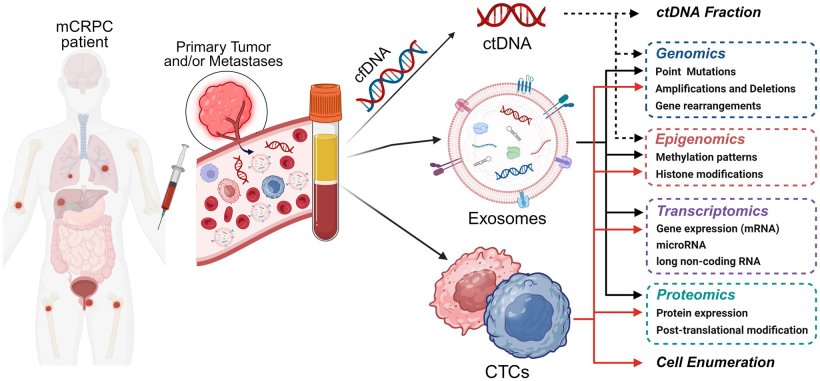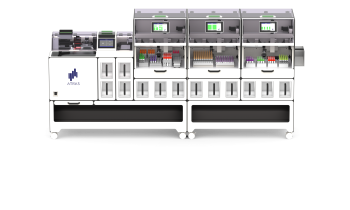
Image source: Bonfil RD, Al-Eyd G, Oncoscience 2023 (CC BY 4.0)
News • CTC, ctDNA and exosomes in PCa management
Prostate cancer: Blood-based liquid biopsies yield valuable information
During the last decade, blood sampling of cancer patients aimed at analyzing the presence of cells, membrane-bound vesicles, or molecules released by primary tumors or metastatic growths emerged as an alternative to traditional tissue biopsies.
The advent of this minimally invasive approach, known as blood-based liquid biopsy, began to play a pivotal role in the management of diverse cancers, establishing itself as a vital component of precision medicine. In the new paper, published in Oncoscience, researchers R. Daniel Bonfil and Ghaith Al-Eyd from Nova Southeastern University discuss three blood-based liquid biopsies, namely circulating tumor cells (CTCs), circulating tumor DNA (ctDNA) and tumor-derived exosomes, as they relate to prostate cancer (PCa) management. “In this research perspective, we present a comprehensive overview of the recent advances related to the clinical significance of blood-based liquid biopsies in PCa, with a primary emphasis placed on key biomarkers such as circulating tumor cells (CTCs), circulating tumor DNA (ctDNA), and exosomes.”
With the assistance of artificial intelligence based on pre-established parameters, the utilization of blood-based liquid biopsies will soon enhance the stratification of PCa patients and facilitate timely therapeutic decision making
R. Daniel Bonfil, Ghaith Al-Eyd
The advances achieved in the molecular characterization of these types of liquid biopsies and their potential to predict recurrence, improve responses to certain treatments, and evaluate prognosis, in PCa patients, are highlighted herein. While there is currently full clinical validation for only one CTC-based and one ctDNA-based liquid biopsy for patients with metastatic castration-resistant PCa, the adoption of additional methods is anticipated as they undergo standardization and achieve analytical and clinical validation. Advantages and disadvantages of different blood-based liquid biopsy approaches in the context of PCa are outlined in this paper, while also considering potential synergies through combinatory strategies. “We anticipate that, with the assistance of artificial intelligence based on pre-established parameters, the utilization of blood-based liquid biopsies will soon enhance the stratification of PCa patients and facilitate timely therapeutic decision making.”
Source: Impact Journals, LLC
11.12.2023











